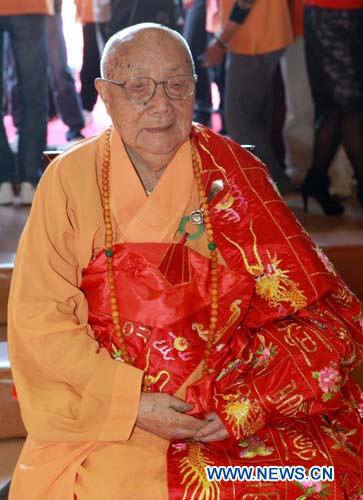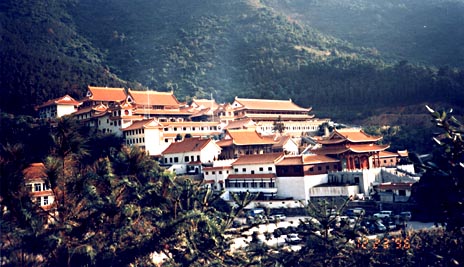Grand Master Ben Huan, one of the most respected of China's Chan masters, passed away this past Monday, April 2, 2012, at the age of 105. He was the Honorary Chairman of the Chinese Buddhist Association and had resided at Hongfa Temple in Shenzhen, near Hong Kong. Grandmaster Ben Huan was one of the ten masters presiding over the first-ever full ordination ceremony to be held at Hong Fa temple in 1998 whereupon he confirmed Chuan Zhi Shakya as Abbot of the Zen Buddhist Order of Hsu Yun. Grandmaster Hsu Yun was also an Honorary Chairman of the Chinese Buddhist Association, from its founding in 1953 until his passing in 1959.
 Grand Master Ben Huan. Photo taken in 2010 at a celebration in honor of his birthday.
Grand Master Ben Huan. Photo taken in 2010 at a celebration in honor of his birthday.
Grand Master Ben Huan, one of the most respected of China's Chan masters, passed away this past Monday, April 2, 2012, at the age of 105. He was the Honorary Chairman of the Chinese Buddhist Association and had resided at Hongfa Temple in Shenzhen, near Hong Kong. Grandmaster Ben Huan was one of the ten masters presiding over the first-ever full ordination ceremony to be held at Hong Fa temple in 1998 whereupon he confirmed Chuan Zhi Shakya as Abbot of the Zen Buddhist Order of Hsu Yun. Grandmaster Hsu Yun was also an Honorary Chairman of the Chinese Buddhist Association, from its founding in 1953 until his passing in 1959.
Benhuan, born in Hubei Province in 1907, is regarded as an eminent Buddhist both in China and overseas. He was also a generous philanthropist. During his 80 years of Buddhism practice, he donated more than 10 million yuan (US$1.59 million) on building roads, schools and hospitals across the country. Hongfa Temple’s charity donations and contributions to spending on public facilities and charity organizations totaled more than 50 million yuan.
Benhuan became a monk in 1930 and was the 44th descendent of the Linji sectarian in Chinese Buddhism. He promoted Buddhism in more than 20 countries and regions, attracting more than 2 million followers.
Benhuan’s legendary spiritual and religiousl acts include holding a meditation that lasted 91 days without sleep in his youth; locking himself in a temple for seven years, spending an entire year travelling on a pilgrimage from Baoding in Hebei Province to Wutai Mountain in Shanxi Province, kowtowing to bodhisattva every three steps, and copying 19 Buddhist scriptures with more than 200,000 characters with blood from his fingers and tongue.
But perhaps most remarkable of all was his photographic memory. According to his disciple Yinshun, who is now the abbot of Hongfa Temple, Benhuan once instantly recognized a visitor who visited him five years before. The famous monk would have tens of thousands of visitors every day asking for blessings.
These blessing seekers would include important government officials and successful businesspeople, but all would be treated equally. Benhuan would tap a stick or a folding fan on their heads while chanting: “Fortune, fortune, make a big fortune; promotion, promotion, have a big promotion.”
 Hong Fa Temple, South China
Hong Fa Temple, South China
Benhuan had been abbot at a number of reputed temples in Guangdong Province, including the Nanhua Temple, the most important temple in the South sectarian of Chinese Buddhism, the Biezhuan Temple in Shaoguan City and Guangxiao Temple in Guangzhou, before becoming the abbot of Shenzhen’s Hongfa Temple.
He founded the Hongfa Temple in 1985 and became the first abbot of Hongfa Temple in 1992. It is considered Shenzhen’s most significant Buddhist temple.
He was elected honorary president of the Buddhist Association of China in 2010.
